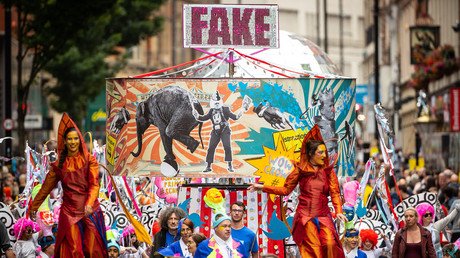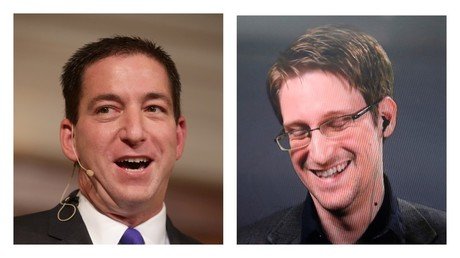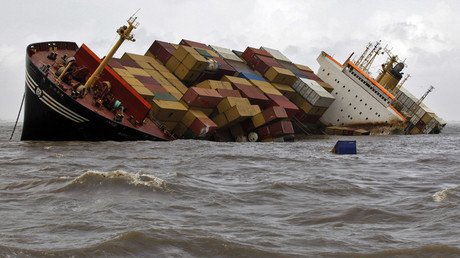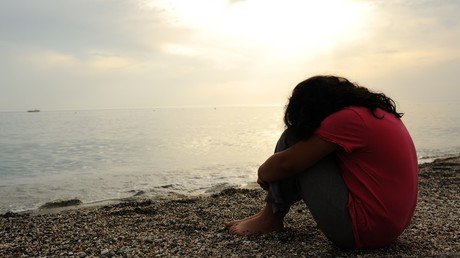Greenwald: I came to Russia to combat US’ toxic view on the country
Too many people in the US consider any contact with Russia suspicious, or worse, journalist Glenn Greenwald told RT. Combating this toxic attitude is one of the reasons he decided to come to Russia this week.
RT caught up with Greenwald, who is best known for his exposés of US electronic surveillance programs based on documents leaked by NSA whistleblower Edward Snowden, after he took part in an expert panel on the phenomenon of fake news. Here is the full interview transcript.
RT: Glenn, you are now in Russia. Going to Russia is seen in the West as almost treason now, even worse than during the times of the Soviet Union. Why do you think that is?
G.G: There is an obsession in the United States with viewing Russia not just as an adversary, but as an actual enemy. It’s permeated by both political parties. There is actual talk a lot now about how what they regards as the interference in the 2016 election is similar to Pearl Harbor, when the Japanese attacked the United States during World War II, or Al Qaeda and 9/11. And there is the sense that Russia is now an enemy on par with Al Qaeda or the Japanese during WWII.
Russia is often talked about this way in the sense that any connection with or interaction with Russia is viewed as inherently suspicious or even worse. It is extremely dangerous and extremely toxic. It’s one of the reasons I decided to come here and this morning posted a picture of myself and Snowden. Because I think it is very important to combat that attitude.
RT: When it comes to core issues, is Trump’s America different from Obama’s America?
G.G: There are definitely differences between Obama and Trump and I could go through a lot of those differences. But most of the controversies that had been the greatest and most intense ones under Trump are really continuations of American political culture and not departures from it.
Even the immigration controversy. President Obama deported more people from the United States than any president in history. The agency that deports people is ICE, which was created under George W Bush and expanded under President Obama. Families were often separated, children were put into cages under President Obama. So you can go down the list and see many of the same policies that get so much attention under Trump that got very little under Obama.
Interestingly, where Russia is concerned, despite all the claims that Trump is a puppet of Russia, in many ways Obama was more cooperative with the Russian government than Trump was. Obama refused to send lethal arms to Ukraine whereas Trump did that. Obama refused to bomb forces of the Assad government – Trump has done that. Trump has expelled more Russian diplomats that Obama did.
So in the cases where they are different, they are often different in a way that is the exact opposite of the way it is described.
RT: It seems there is consensus in the Western media and political elites that Russia was responsible for the Skripal poisoning. Yet we are still waiting for evidence to be presented. Is it not essential for a just and informed discourse that we wait for evidence in this and other cases before jumping to conclusions?
G.G: I think one of the most important principles in any political system is that people shouldn’t be presumed to be guilty – governments shouldn’t be presumed guilty – unless evidence is presented of their guilt. I don’t even think that is controversy and I don’t know when it became controversy. I thought that was the lesson of the Iraq war.
And yet when Jeremy Corbyn stood up and said: before we blame the Russian government for this poisoning, we ought to see evidence that they are actually responsible, the British media treated him as though he had said something evil.
So as a journalist especially, the principle that I believe in, probably, above all others is that no guilt should be assumed without evidence of that guilt being demonstrated.
RT: There are anti-establishment voices on the right and on the left. How has the perceptions of the left and the right shifted?
G.G: I think, in Italy you see, for example, that what is traditionally the right and the left is changing very dramatically. There is a government in place formed by a coalition of what traditionally has been called the left and the right. But they are now really called more opposition to the establishment.
In the United States for a long time this shift has been taking place. Two of the most important protest movements in the US – one was the Tea Party, the other was Occupy Wall Street – were both perceived to be on different ends of the political spectrum. Yet they had very similar issues in common. They were protesting the bailout of Wall Street after the Wall Street crisis, the domination of corporations. When Donald Trump ran for president, even though he was perceived as a right-wing candidate, he did so by criticizing the Iraq war, by criticizing American militarism, by promising to ‘drain the swamp’ of corporate influence.
You see a similar dynamic in Brexit, where there were elements of the right and the left against the European Union. I think that left and right as we understood them for the last four decades are starting to morph into pro-establishment and anti-establishment dynamics and that will only continue.
RT: Have the last two years of inquiries and reports convinced you that Trump colluded with Russia?
G.G: No, if anything, it’s convinced me that it’s more unlikely than ever. There are factions within the intelligence community of the United States, the NSA, the CIA, the FBI that hate Donald Trump and will do anything to destroy him, including leaking classified information against him. I believe that if there were evidence of collusion between Trump and the Russian government, when it comes to the hacking of the DNC or the John Podesta emails, we would have seen in by now. We have not seen it by now.
Even people, who hate Donald Trump in the CIA, have tried to warn the Democrats: don’t expect there to be evidence of it; we don’t have evidence of it. But it’s like a religious belief to other people in the United States. And of course as we know religion doesn’t require evidence.
I don’t say it didn’t happen, because it could have happened. All I say is until there is evidence of it I don’t think we should believe it happened. And so far there is no evidence.
Think your friends would be interested? Share this story!
















